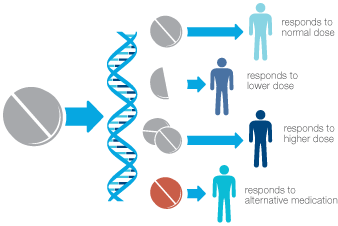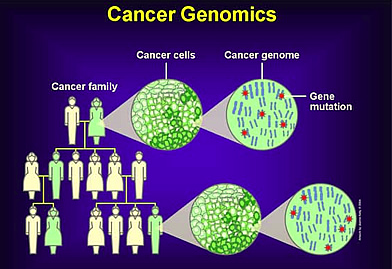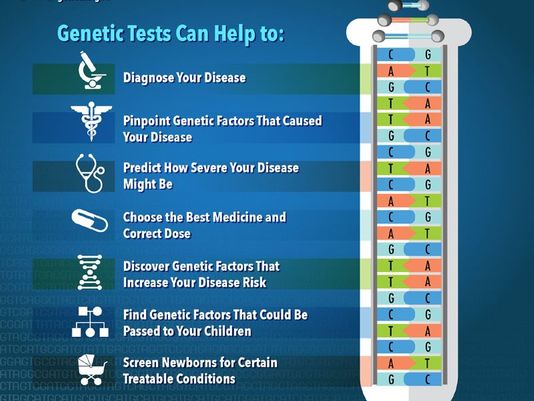PHARMACOGENETICS
What is Pharmacogenetics?
"Pharmacogenetics(PGx) is the relationship between a patient's unique genetic makeup and their response to certain medications. Genetic mutations can cause either higher or lower rates of metabolism for known drugs. According to the FDA, each year, approximately 4.5 million Americans visit their doctors or the emergency room due to adverse drug reactions. "
How Will Pharmacogenetics Benefit My Patients?
Our lab partners will offer a comprehensive record based totally on a person affected a person's genetic make-up with a view to suggesting metabolic rates for described medicinal drugs. This information will help physicians prescribe the proper drug on the right dose based on their patients DNA profile.

Labs
- CYP 2D6
- CYP 2C9-VK0RC1
- CYP 3A4-3A5
- CYP 2C19
- Factor II
- F V Leiden
- MTHFR
Schedule An Appointment To Learn More About Our Services

CANCER GENOMICS
What Is Cancer Genomics?
The study of cancer genomes has revealed abnormalities in genes which prone the development and growth of many types of cancer.
This understanding has improved our knowledge of the biology of most cancers and brought about new methods of diagnosing and treating the disease.
How Will Cancer Genomics Benefit My Patients?
Early diagnosis is the key to treating potentially serious conditions. The earlier a patient begins treatment the greater the chances of full recovery. Our Genetic Counselors are trained to guide your patient through the emotional, psychological, and social consequences. This also enables the clinician to determine disease aggressiveness, therefore facilitating a more informed treatment plan.
Labs
- Breast Cancer
- Colorectal Cancer
- Lynch Syndrome
- Prostate Cancer
- Melanoma Cancer
- Pancreatic Cancer
Schedule An Appointment To Learn More About Our Services
RESPIRATORY PANEL
Upper Respiratory Tract
Infection
An estimated 55% of antibiotic prescriptions for Acute Respiratory Tract Infections are unnecessary. The misuse of antibiotics costs the US healthcare system over $20 billion each year.
Estimated economic impact of non-influenza related URTIs is $40 Billion annually in the US.
Adults average 2-5 upper respiratory tract infections each year while children average 7-10 upper respiratory tract infections a year.
The respiratory panel pathogens target 17 viral pathogens and 4 bacterial pathogens. This test targets the pathogens RNA's and DNA's. Since an infected person shows the same symptoms for most of these pathogens, the respiratory panel pathogens will provide a more accurate information to clinicians to treat your patients.

Labs
Viral Targets
- Adenovirus
- Coronavirus HKU1
- Coronavirus NL63
- Coronavirus 229E
- Coronavirus OC43
- Human Metapneumovirus
- Human Rhinovirus/Enterovirus
- Influenza A
- Influenza A/H1
- Influenza A/H3
- Influenza A/H1-2009
- Influenza B
- Parainfluenza Virus 1
- Parainfluenza Virus 2
- Parainfluenza Virus 3
- Parainfluenza Virus 4
- Respiratory Syncytial Virus
Labs
Bacterial Targets
- Bordetella parapertussis (IS1001)
- Bordetella pertussis (ptxP)
- Chlamydophila pneumoniae
- Mycoplasma pneumoniae
Schedule An Appointment To Learn More About Our Services

GASTROINTESTINAL PANEL
Benefit Of GI Pathogens
The GI pathogens Panel targets 6 Bacterial pathogens, 5 Diarrheagenic E.coli/Shigella, 4 Parasitic pathogens and 5 viral pathogens. This test targets the pathogens RNA's and DNA's. Since an infected person shows the same symptoms for most of these pathogens, the GI panel pathogens will provide more accurate information to clinicians to treat your patients.
Labs
Bacteria
- Campylobacter (Jejuni, coli and upsaliensis)
- Clostridium difficile (Toxin A/B)
- Plesiomonas shigelloides
- Diarrheagenic E.coli/Shigella
- Enteropathogenic E. coli (EPEC)
- Enteroaggregative E. coli (EAEC)
- Enterotoxigenic E. coli (ETEC) lt/st
- Shiga-like toxin-producing E. coli (STEC) stx1/stx2
- coli 0157
- Shigella/Enteroinvasive E. coli (EIEC)
- Salmonella
- Yersinia enterocolitica
- Vibrio (Parahaemolyticus, vulnificus and cholerae)
Labs
Parasites
- Cryptosporidium
- Cyclospora cayetanensis
- Entamoeba Histolytica
- Giardia lamblia
Labs
Viruses
- Adenovirus F40/41
- Astrovirus
- Norovirus GI/GII
- Rotavirus A
- Sapovirus (I, II, IV and V)
Schedule An Appointment To Learn More About Our Services
WOMEN'S HEALTH
The Importance of Women's Health.
A woman's health is her total well-being, not determined solely by biological factors and reproduction, but also by effects of workload, nutrition, stress, war, and migration, among others?

Labs
- GYN Cytology
- Human Papilloma Virus Testing
- General Cytology
- Histology & Special Stains
- Microbiology
Labs
Genetic Testing
These assays include:
Profiles:
- CT/NG (Chlamydia/Gonorrhea)
- CT/NG (Chlamydia/Gonorrhea) with negative reflex to Mycoplasma genitalium
- HSV 1 & 2 (Herpes Simplex Virus, Type 1 & 2)
- Vaginosis Panel by BD Affirm (Candida species, Gardnerella vaginalis & Trichomonas vaginalis)
- Vaginosis Panel by PCR (Candida species, Gardnerella vaginalis & Trichmonas vaginalis)
- Vaginosis Panel by PCR with negative Gardnerella vaginalis reflex to Atopobium vaginae
- Vaginosis Panel by PCR with reflex to Candida Speciation (8 species: C. albicans, C. glabrata, C. krusei, C. parapsilosis, C. tropicalis, C. kefyr, C. guillermondi, C. lusitaniae, C. rugosa)
Labs
Genetic Testing
Individual Tests:
- Atopobium vaginae
- Candida species
- Chlamydia trachomatis (CT)
- Cervical TERC FISH
- Cystic Fibrosis (23 Mutations)
- Human Papilloma Virus by GenProbe APTIMA (HPV HR or HPV 16/18/45)
- Human Papilloma Virus by Roche COBAS (HPV HR, HPV 16, 18 and 12 other pooled)
- Human Papilloma Virus by Roche COBAS (HPV PRIMARY SCREENING with Reflex to Pap)
- Gardnerella vaginalis
- Group B Streptococcus
- Herpes Simplex Virus 1 (HSV 1)
- Herpes Simplex Virus 2 (HSV 2)
- Mycoplasma genitalium
- Neisseria gonorrhea (NG)
- Trichomonas vaginalis
Schedule An Appointment To Learn More About Our Services

GENETIC TESTING
Genetic testing is a type of medical test that identifies changes in chromosomes, genes, or proteins. The results of a genetic test can confirm or rule out a suspected genetic condition or help determine a person’s chance of developing or passing on a genetic disorder. More than 1,000 genetic tests are currently in use, and more are being developed.
Several methods can be used for genetic testing:
- Molecular genetic tests (or gene tests) study single genes or short lengths of DNA to identify variations or mutations that lead to a genetic disorder.
- Chromosomal genetic tests analyze whole chromosomes or long lengths of DNA to see if there are large genetic changes, such as an extra copy of a chromosome, that cause a genetic condition.
- Biochemical genetic tests study the amount or activity level of proteins; abnormalities in either can indicate changes to the DNA that result in a genetic disorder.
Genetic testing is voluntary. Because testing has benefits as well as limitations and risks, the decision about whether to be tested is a personal and complex one. A geneticist or genetic counselor can help by providing information about the pros and cons of the test and discussing the social and emotional aspects of testing.
Schedule An Appointment To Learn More About Our Services
ELECTRO STIMULATION
Advanced Electro Stimulation Pain Relief Technology
Non-narcotic pain-relief for diabetic nerve pain, osteoarthritis, back pain, neck pain, carpal tunnel syndrome and more.
A service for treating patients living with chronic pain, using technologies and protocols that are non-pharmacological and non-narcotic. We use interventional techniques to treat your patient’s pain while focusing on reducing their opioid and other pain medication use.

